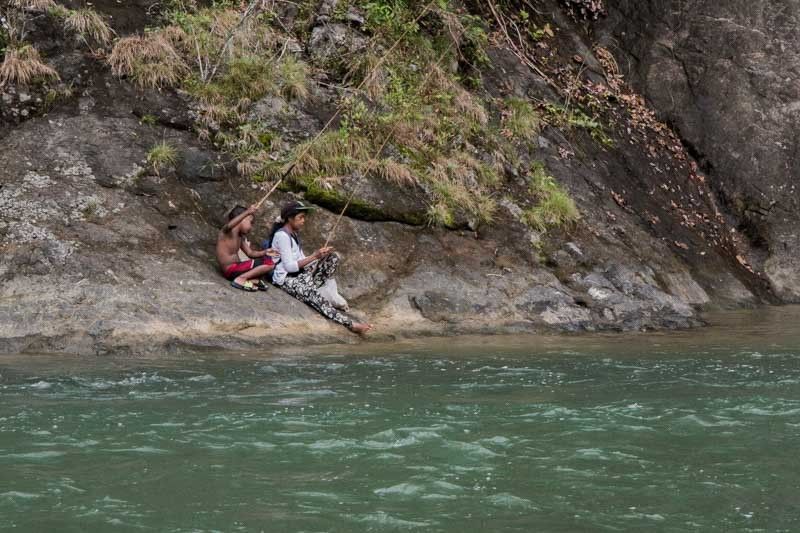No ‘greater good’ in Kaliwa Dam project if lives, rights are at risk — green group

MANILA, Philippines — There is no “greater good” if the Kaliwa Dam project—seen as a solution to Metro Manila’s growing demand for water—if it puts the rights and lives of indigenous and downstream communities in Rizal and Quezon provinces at risk.
Environmental group Kalikasan People’s Network for the Environment stressed this Wednesday after President Rodrigo Duterte said he is mulling the use of police powers to start the construction of the controversial China-funded dam.
“My concern is the welfare—the greatest good for the greatest number. That is democracy,” the chief executive said Monday.
But Leon Dulce, Kalikasan PNE national coordinator, said “there is ‘no greater good’ in militarizing the ancestral lands of the indigenous Dumagat and Remontado” for a 600-MLD (million liters per day) project when experts note there are at least 8,255 MLD worth of safer, alternative water sources.
“There is also no ‘greater good’ if the supposed water solution will result into forest destruction that will cascade into multiple risks. In the proposed Kaliwa Dam, around 300 hectares of forest area will be submerged with water,” Dulce added.
He also said that forest clearing can result in decrease in precipitation rate and worsen sediment pollution, making the planned reservoir’s “increasingly unpotable.”
Last October 11, the Environment department’s Environmental Management Bureau issued an Environmental Compliance Certificate to Metropolitan Waterworks and Sewerage System for the proposed dam project despite opposition from environmental groups, indigenous peoples communities and local governments.
Obtaining ECC allows a project to proceed to the next stage of planning, which includes securing approvals from other government agencies.
The National Commission on Indigenous Peoples, however, has yet to certify that the project has Free, Prior and Informed Consent. FPIC is a requirement for projects concerning ancestral domains.
SPECIAL REPORT: In the abundance of water: A dam project may wash away generations-old Dumagat villages
Solution to water crisis?
Duterte’s statement that he is considering the use of “extraordinary powers of the presidency” for the construction of Kaliwa Dam would lead to a “human rights crisis,” the national coordinator of Kalikasan PNE warned.
“The civic-political, socio-economic and cultural, and environmental rights of thousands upon thousands of indigenous, farmer and downstream communities are clearly at risk. But the Kaliwa Dam has been granted an environmental compliance certificate and now enforcement through police powers without assessing and addressing these grave risks,” Dulce said.
The Sandugo Movement of Moro and Indigenous Peoples for Self-Determination, for its part, claimed the Duterte government is geared toward the “ethnocide of the national minorities to pave way for unlimited exploitation of natural resources” with the construction of Kaliwa Dam.
“This will displace thousands of farmers and Dumagat people who are considered the caretakers of the natural resources along the Sierra Madre mountain ranges,” Kerlan Fanagel, Sandugo spokesperson, said Wednesday.
"Truth is, the construction of the Kaliwa dam is not the immediate solution to the 'water shortage'. The Kaliwa dam will take years to construct before it can operate," Fanagel also said.
"But if the Duterte government really wants to address this, he must use his political will to nationalize the water service and urgently craft a plan to provide water for people of Manila."
Dulce called on the Commission on Human Rights and the United Nations Human Rights Council to monitor the possible escalation of violations.
“There must be an independent probe into the threat of a human rights crisis that the railroading of environmental impact assessment, FIPC and other regulatory processes will create, and which enforcement through police powers will definitely exacerbate,” Dulce said.
CHR on Monday urged the government to be “mindful” of its state obligations in pursuing the dam project.
“While we recognize that there is a legitimate concern on water security in Metro Manila, this should not come at the expense of human rights of affected indigenous communities and their land’s biodiversity,” Jacqueline de Guia, CHR spokesperson, said.
PHOTO ESSAY: Agos River: Where life flows for the Dumagat people
- Latest
- Trending





























